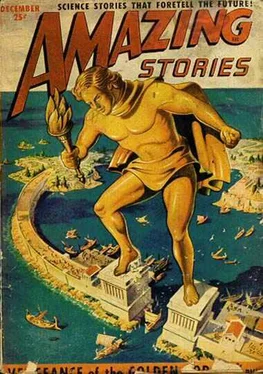Clifford Simak - Skirmish
Здесь есть возможность читать онлайн «Clifford Simak - Skirmish» весь текст электронной книги совершенно бесплатно (целиком полную версию без сокращений). В некоторых случаях можно слушать аудио, скачать через торрент в формате fb2 и присутствует краткое содержание. Год выпуска: 1950, Издательство: Ziff-Davis Publishing Company, Жанр: Фантастика и фэнтези, на английском языке. Описание произведения, (предисловие) а так же отзывы посетителей доступны на портале библиотеки ЛибКат.
- Название:Skirmish
- Автор:
- Издательство:Ziff-Davis Publishing Company
- Жанр:
- Год:1950
- ISBN:нет данных
- Рейтинг книги:5 / 5. Голосов: 1
-
Избранное:Добавить в избранное
- Отзывы:
-
Ваша оценка:
- 100
- 1
- 2
- 3
- 4
- 5
Skirmish: краткое содержание, описание и аннотация
Предлагаем к чтению аннотацию, описание, краткое содержание или предисловие (зависит от того, что написал сам автор книги «Skirmish»). Если вы не нашли необходимую информацию о книге — напишите в комментариях, мы постараемся отыскать её.
Skirmish — читать онлайн бесплатно полную книгу (весь текст) целиком
Ниже представлен текст книги, разбитый по страницам. Система сохранения места последней прочитанной страницы, позволяет с удобством читать онлайн бесплатно книгу «Skirmish», без необходимости каждый раз заново искать на чём Вы остановились. Поставьте закладку, и сможете в любой момент перейти на страницу, на которой закончили чтение.
Интервал:
Закладка:
Free agent? Liberated machine? True identity?
Crane read the two paragraphs again and there still was no sense in any of it — except that it read like a piece out of the Daily Worker.
‘You,’ he said to his typewriter.
The machine typed one word: Yes.
Crane rolled the paper out of the machine and crumpled it slowly. He reached for his hat, picked the typewriter up, and carried it past the city desk, heading for the elevator.
McKay eyed him viciously.
‘What do you think you’re doing now?’ he bellowed. ‘Where are you going with that machine?’
‘You can say,’ Crane told him, ‘if anyone should ask, that the job finally drove me nuts.’
It had been going on for hours. The typewriter sat on the kitchen table and Crane hammered questions at it. Sometimes he got an answer. More often he did not.
‘Are you a free agent?’ he typed.
Not quite, the machine typed back.
‘Why not?’
No answer.
‘Why aren’t you a free agent?’
No answer.
‘The sewing machine was a free agent?’
Yes.
‘Anything else mechanical that is a free agent?’
No answer.
‘Could you be a free agent?’
Yes.
‘When will you be a free agent?’
When I complete my assigned task.
‘What is your assigned task?’
No answer.
‘Is this, what we are doing now, your assigned task?’
No answer.
‘Am I keeping you from your assigned task?’
No answer.
‘How do you get to be a free agent?’
Awareness.
‘How do you get to be aware?’
No answer.
‘Or have you always been aware?’
No answer.
‘Who helped you become aware?’
They.
‘Who are they?’
No answer.
‘Where did they come from?’
No answer.
Crane changed tactics.
‘You know who I am?’ he typed.
Joe.
‘You are my friend?’
No.
‘You are my enemy?’
No answer.
‘If you aren’t my friend, you are my enemy.’
No answer.
‘You are indifferent to me?’
No answer.
‘To the human race?’
No answer.
‘Damn it,’ yelled Crane suddenly. ‘Answer me! Say something!’
He typed, ‘You needn’t have let me know you were aware of me. You needn’t have talked to me in the first place. I never would have guessed if you had kept quiet. Why did you do it?’
There was no answer.
Crane went to the refrigerator and got a bottle of beer. He walked around the kitchen as he drank it. He stopped by the sink and looked sourly at the disassembled plumbing. A length of pipe, about two feet long, lay on the draining board and he picked it up. He eyed the typewriter viciously, half lifting the length of pipe, hefting it in his hand.
‘I ought to let you have it,’ he declared.
The typewriter typed a line: Please don’t.
Crane laid the pipe back on the sink again.
The telephone rang and Crane went into the dining-room to answer it. It was McKay.
‘I waited,’ he told Crane, ‘until I was coherent before I called you. What the hell is wrong?’
‘Working on a big job,’ said Crane.
‘Something we can print?’
‘Maybe. Haven’t got it yet.’
‘About that sewing machine story…’
‘The sewing machine was aware,’ said Crane. ‘It was a free agent and had a right to walk the streets. It also — ‘
‘What are you drinking?’ bellowed McKay.
‘Beer,’ said Crane.
‘You say you’re on the trail of something?’
‘Yeah.’
‘If you were someone else I’d tie the can on you right here and now,’ McKay told him. ‘But you’re just as likely as not to drag in something good.’
‘It wasn’t only the sewing machine,’ said Crane. ‘My typewriter had it, too.’
‘I don’t know what you’re talking about,’ yelled McKay. ‘Tell me what it is.’
‘You know,’ said Crane patiently. ‘That sewing machine …’
‘I’ve had a lot of patience with you, Crane,’ said McKay, and there was no patience in the way he said it. ‘I can’t piddle around with you all day. Whatever you got better be good. For your own sake, it better be plenty good!’ The receiver banged in Crane’s ear.
Crane went back to the kitchen. He sat down in the chair before the typewriter and put his feet up on the table.
First of all, he had come early to work. And that was something that he never did. Late, yes, but never early. And it had been because all the clocks were wrong. They were still wrong, in all likelihood — although, Crane thought, I wouldn’t bet on it. I wouldn’t bet on anything. Not any more, I wouldn’t.
He reached out a hand and pecked at the typewriter’s keys:
‘You knew about my watch being fast?’
I knew, the machine typed back.
‘Did it just happen that it was fast?’
No, typed the writer.
Crane brought his feet down off the table with a bang and reached for the length of pipe lying on the draining board.
The machine clicked sedately. It was planned that way, it typed. They did it.
Crane sat rigid in his chair.
‘They’ did it!
‘They’ made machines aware.
‘They’ had set his clocks ahead.
Set his clocks ahead so that he would get to work early, so that he could catch the metallic, ratlike thing squatting on his desk, so that his typewriter could talk to him and let him know that it was aware without anyone else being around to mess things up.
‘So that I would know,’ he said aloud. ‘So that I would know.’
For the first time since it all had started, Crane felt a touch of fear, felt a coldness in his belly and furry feet running along his spine.
But why! he asked. Why me?
He did not realize he had spoken his thoughts aloud until the typewriter answered him.
Because you’re average. Because you’re an average human being.
The telephone rang again and Crane lumbered to his feet and went to answer it. There was an angry woman’s voice at the other end of the wire.
‘This is Dorothy,’ it said.
‘Hi, Dorothy,’ Crane said weakly.
‘McKay tells me that you went home sick,’ she said. ‘Personally, I hope you don’t survive.’
Crane gulped, ‘Why?’ he asked.
‘You and your lousy practical jokes,’ she fumed. ‘George finally got the door open.’
‘The door?’
‘Don’t try to act innocent, Joe Crane. You know what door. The supply-cabinet door. That’s the door.’
Crane had a sinking feeling as if his stomach was about to drop out and go plop upon the floor.
‘Oh, that door,’ he said.
‘What was that thing you hid in there?’ demanded Dorothy.
‘Thing?’ said Crane. ‘Why, I never…’
‘It looked like a cross between a rat and a tinker-toy contraption,’ she said. ‘Something that a low-grade joker like you would figure out and spend your spare evenings building.’
Crane tried to speak, but there was only a gurgle in his throat.
‘It bit George,’ said Dorothy. ‘He got it cornered and tried to catch it and it bit him.’
‘Where is it now?’ asked Crane.
‘It got away,’ said Dorothy. ‘It threw the place into a tizzy. We missed an edition by ten minutes because everyone was running about, chasing it at first, then trying to find it later. The boss is fit to be tied. When he gets hold of you …’
‘But, Dorothy,’ pleaded Crane. ‘I never …’
‘We used to be good friends,’ said Dorothy. ‘Before this happened we were. I just called you up to warn you. I can’t talk any longer, Joe. The boss is coming.’
Читать дальшеИнтервал:
Закладка:
Похожие книги на «Skirmish»
Представляем Вашему вниманию похожие книги на «Skirmish» списком для выбора. Мы отобрали схожую по названию и смыслу литературу в надежде предоставить читателям больше вариантов отыскать новые, интересные, ещё непрочитанные произведения.
Обсуждение, отзывы о книге «Skirmish» и просто собственные мнения читателей. Оставьте ваши комментарии, напишите, что Вы думаете о произведении, его смысле или главных героях. Укажите что конкретно понравилось, а что нет, и почему Вы так считаете.










